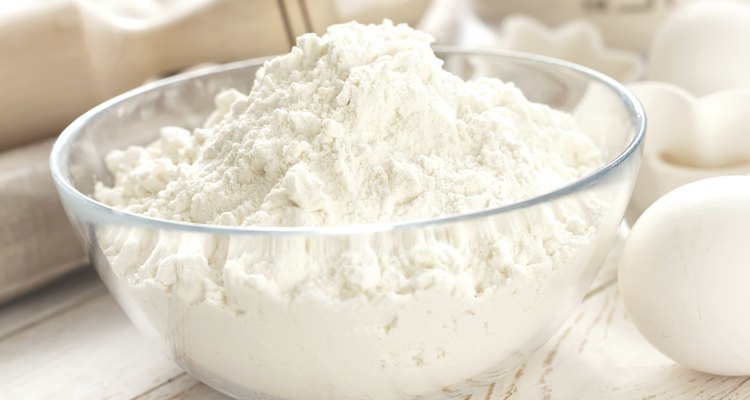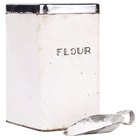
YelenaYemchuk/iStock/Getty Images
Think twice before you toss that bag of flour into the pantry. Flour options available at grocery stores have vastly expanded and each type has its own set of rules for proper storage. Your flour might need to be stored in the freezer or, depending on the package it came in, stored in a different container to protect it from grain bugs. Properly storing whichever type of flour you purchase will ensure maximum freshness and quality.
Flour Storage Containers
All flour, no matter what type, must be kept in a moisture-free environment to keep it fresh for as long as possible. Keeping flour in the regular paper or burlap bag it came in doesn't protect it well for long-term storage. Transfer the flour to a glass or plastic storage container with an airtight lid, which also keeps grain weevils and other insects that can chew through paper out of your flour. If you prefer to keep the flour in the bag it came in, place the whole bag inside of a large, resealable freezer bag, squeezing out as much air as possible.
Refined Flours
Refined flour, such as all-purpose, pastry and self-rising flour, has a relatively long shelf life, as the naturally oily bran and germ layers of the wheat have been removed. It can be stored in an airtight container in a cool, dark and dry area, like a pantry with a temperature kept below 75 degrees Fahrenheit. Before storing it in the pantry, place the flour in the freezer for at least a week, which will destroy any possible grain weevils and eggs. If you choose to store refined flour in the refrigerator, it can last at least a year, or in the freezer at 0 F, for several years.
Whole-Grain and Alternative Flours
Whole-grain flour, including whole wheat, oat and buckwheat, starts to go rancid as soon as it is exposed to air, because of its high amounts of natural oils. Store it in the refrigerator or freezer to extend its shelf life for as long as possible. If you prefer to store these kinds of flour in the pantry, keep them in the freezer for a week first, as with refined flour, to kill off any possible grain weevils. Whole-grain flour can be stored in the pantry for up to three months. If stored in the fridge, use the flour within eight months, or store in the freezer for up to a year. Alternative flours, such as almond, hemp seed or coconut flour, tend to have very high levels of oil and should not be kept at room temperature at all. Keep them in the refrigerator for six months or the freezer for up to a year.
A Few Tips
If you are storing flour in the refrigerator, keep it away from any foods that have a strong odor, such as onions, cooked eggs and leftover foods. Keep a container of baking soda open in the back of the refrigerator to help absorb the odors.
Let flour that has been in the refrigerator or freezer come up to room temperature before using for best results.
Sniff the flour before each use, and discard any that has a sour or burnt rubber type of smell. Nut and seed flours should have a nutty, slightly sweet smell as well. If it has any type of "off" smell, toss it out. If you're not sure, taste the flour. If it tastes bitter, don't use it.
Related Articles
How to Keep Flour for Long-Term Storage

Does Flour Expire?

Does it Help to Keep Flour in the ...

Does Flour Get Old or Go Bad?

Does Flour Spoil?

If Flour Has Never Been Opened Can It ...

How to Store Flours & Grains Without ...

Can You Use Musty Smelling Flour?

How Do You Keep Bugs Out of Baking ...

How to Roast Chickpea Flour

What Is Amaranth Flour?
How to Tell If Flour Is Rancid

How to Store Oat Bran
Methods of Long-Term Food Storage for ...

Can I Freeze Wheat Berries?

Bugs That Get Into Pantry & Food

How Is Wheat Processed?

About Weevils

How to Freeze Tortilla Shells

Substitute for Gram or Besan Flour
References
- Mind Body Green: How to Properly Store Flour
- The Kitchn: A Complete Guide to Flour Storage
- University of Missouri Extension: Using and Storing All-Purpose Flour
- Los Angeles Times: Test Kitchen Tips: Storing Flour
- What's Cooking America: Types of Flour
- The Kitchn: How to Prevent and Get Rid of Grain Weevils
Writer Bio
Based in Los Angeles, Zora Hughes has been writing travel, parenting, cooking and relationship articles since 2010. Her work includes writing city profiles for Groupon. She also writes screenplays and won the S. Randolph Playwriting Award in 2004. She holds a Bachelor of Arts in television writing/producing and a Master of Arts Management in entertainment media management, both from Columbia College.
Photo Credits
YelenaYemchuk/iStock/Getty Images